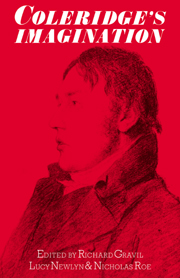Book contents
- Frontmatter
- Contents
- Pete Laver: a memoir
- Abbreviations
- Introduction
- Romantic imagination, nature and the pastoral ideal
- ‘The infinite I AM’: Coleridge and the Ascent of being
- Struggling with the contingent: self-conscious imagination in Coleridge's notebooks
- Coleridge's rejection of nature and the natural man
- The imagination of Mrs Samuel Taylor Coleridge: unknown inspiration of an unknown tongue
- ‘As much diversity as the heart that trembles’: Coleridge's notes on the lakeland fells
- ‘Leaping and lingering’: Coleridge's lyrical ballads
- ‘Radical Difference’: Coleridge and Wordsworth, 1802
- Imagining Wordsworth: 1797–1807–1817
- The Otway connection
- Imagining Robespierre
- Coleridge's Dejection: imagination, joy and the power of love
- Imagining naming shaping: stanza VI of Dejection: an Ode
- Mythopoesis: the unity of Christabel
- The languages of Kubla Khan
- Notes on the contributors
- Index
Romantic imagination, nature and the pastoral ideal
Published online by Cambridge University Press: 04 August 2010
- Frontmatter
- Contents
- Pete Laver: a memoir
- Abbreviations
- Introduction
- Romantic imagination, nature and the pastoral ideal
- ‘The infinite I AM’: Coleridge and the Ascent of being
- Struggling with the contingent: self-conscious imagination in Coleridge's notebooks
- Coleridge's rejection of nature and the natural man
- The imagination of Mrs Samuel Taylor Coleridge: unknown inspiration of an unknown tongue
- ‘As much diversity as the heart that trembles’: Coleridge's notes on the lakeland fells
- ‘Leaping and lingering’: Coleridge's lyrical ballads
- ‘Radical Difference’: Coleridge and Wordsworth, 1802
- Imagining Wordsworth: 1797–1807–1817
- The Otway connection
- Imagining Robespierre
- Coleridge's Dejection: imagination, joy and the power of love
- Imagining naming shaping: stanza VI of Dejection: an Ode
- Mythopoesis: the unity of Christabel
- The languages of Kubla Khan
- Notes on the contributors
- Index
Summary
There exists a natural and almost inevitable affinity between the Romantic and the pastoral, what in good Romantic terminology might be called a Wahlverwandschaft. Romanticism might be sickness, as Goethe said, but pastoral was its balm. Romanticism was frenzy, and pastoral was peace. It was the disruptive force of the French Revolution, said Hazlitt, that stirred English poetry into Romanticism and moulded its character:
From the impulse it thus received, it rose at once from the most servile imitation and tamest common-place, to the utmost pitch of singularity and paradox. … There was a mighty ferment in the heads of statesmen and poets, kings and people. … According to the prevailing notions, all was to be natural and new. Nothing that was established was to be tolerated. … A striking effect produced where it was least expected, something new and original, no matter whether good, bad, or indifferent. ‥ was all that was aimed at. … The world was to be turned topsy-turvy; and poetry, by the good will of our Adam-wits, was to share its fate and begin de novo.
Above all, Romanticism was a convulsive response to a growing sense of perplexity and confusion with regard to received assumptions of social order, religious assurance, and economic possibility. Against this expanding complexity, pastoral proffered the vision of a simpler existence. It had muted since its Theocritan origins the eternal hurly-burly of city and court (the ‘court news’ of which ‘poor rogues’ talk has always been a matter of ‘Who loses and who wins; who's in, who's out’).
- Type
- Chapter
- Information
- Coleridge's ImaginationEssays in Memory of Pete Laver, pp. 5 - 21Publisher: Cambridge University PressPrint publication year: 1985



